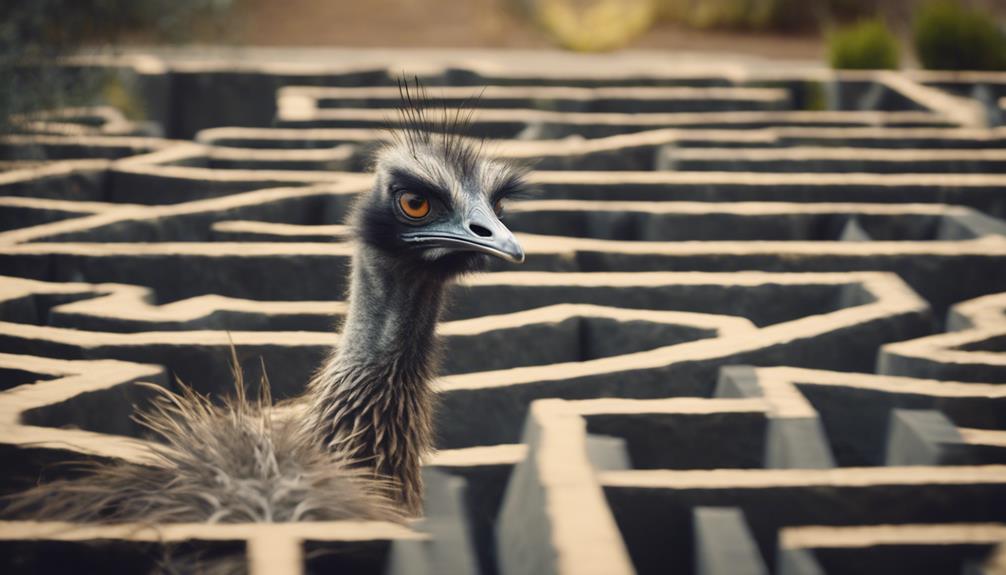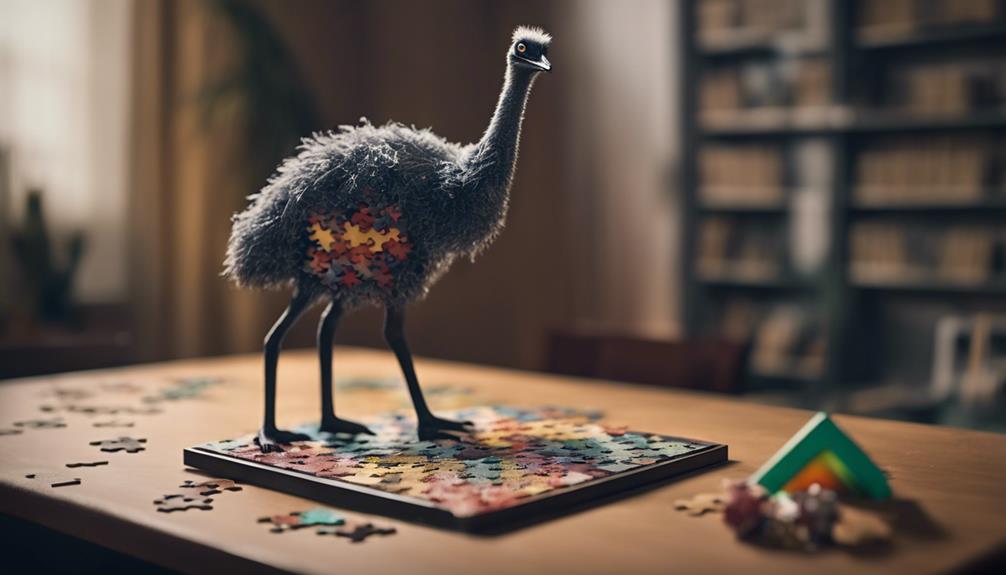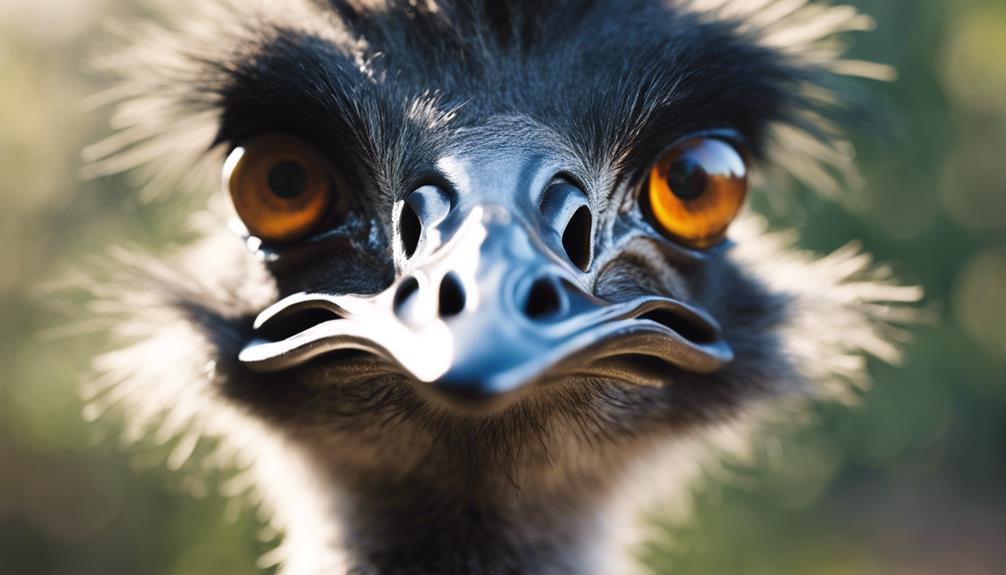
You may think of emus as just fast, flightless birds, but did you know that their intelligence might surprise you?
From problem-solving skills to cognitive flexibility, these unique creatures exhibit remarkable abilities that challenge traditional notions of avian cognition.
As we explore the depths of emus' learning and memory capabilities, fascinating insights emerge about the intricacies of their minds and behaviors.
Stay tuned to uncover the intriguing world of emus and their unexpected intelligence.
Key Takeaways
- Emus showcase problem-solving skills and memory retention in diverse contexts.
- Their cognitive flexibility and social intelligence aid in adaptive responses to challenges.
- Memory adaptability is crucial for thriving in changing environments and social dynamics.
- Researchers evaluate Emus' intelligence through problem-solving, memory, and social interaction tests.
Emus: Not Just Speedy Runners

Emus exhibit remarkable cognitive abilities beyond their well-known reputation as swift runners, showcasing a surprising level of intelligence in various behaviors and problem-solving tasks. When it comes to spatial navigation, emus display an impressive knack for remembering and retracing their paths. Studies have shown that these birds can recall specific locations of resources such as food and water over long distances, highlighting their advanced spatial memory capabilities.
In terms of social interactions, emus exhibit complex behaviors that suggest a high level of social intelligence. They engage in intricate courtship rituals, maintain long-lasting bonds with their mates, and display cooperative behaviors within their groups. Observations have revealed that emus communicate through a variety of vocalizations and body language cues, indicating a sophisticated social communication system.
Emu Problem-Solving Skills
In studying the cognitive abilities of emus beyond their physical prowess, researchers have uncovered intriguing insights into the problem-solving skills of these avian creatures. Emus exhibit remarkable problem-solving strategies, often employing trial and error methods to overcome challenges. Observations suggest that emus possess a keen ability to assess situations and adapt their approaches based on past experiences, indicating a sophisticated level of cognitive processing.
Memory formation plays a crucial role in the problem-solving abilities of emus. These birds demonstrate the capacity to remember past solutions to similar problems, allowing them to apply previously successful strategies to new challenges. Through this process, emus exhibit a form of cognitive flexibility that enables them to navigate various problem-solving scenarios with agility and efficiency.
Memory Retention in Emus

Demonstrating an impressive capacity for memory retention, emus exhibit a remarkable ability to recall past solutions when faced with similar problem-solving challenges. Memory consolidation plays a crucial role in enhancing their recall accuracy. Emus employ various learning strategies and retention mechanisms to store and retrieve information effectively.
Research suggests that emus utilize associative learning, a process where they link different stimuli to form memories. By associating specific cues with actions or outcomes, emus enhance their ability to recall past experiences. This learning strategy enables them to remember successful solutions and apply them when encountering similar situations.
Furthermore, emus demonstrate a keen sense of memory retention through repetition and reinforcement. By repeatedly practicing certain behaviors or actions, they strengthen the neural pathways associated with those activities, leading to improved retention over time. This retention mechanism aids emus in recalling learned behaviors quickly and accurately, showcasing their cognitive prowess in memory-related tasks.
Emus' Cognitive Abilities
Enhancing their problem-solving prowess, the cognitive abilities of emus reveal a sophisticated capacity for learning and adaptation in various environmental contexts. Emus exhibit remarkable social cognition, displaying an understanding of social dynamics within their groups. They're adept at observational learning, quickly picking up behaviors by watching others, which aids in their survival strategies. Moreover, emus showcase impressive spatial navigation skills, effortlessly finding their way through complex terrains and recognizing landmarks for orientation.
Interestingly, emus have also demonstrated tool use in certain situations, showcasing a level of cognitive flexibility not commonly associated with birds. They can use objects in their environment to achieve specific goals, indicating a higher level of problem-solving ability than previously thought. This adaptability and cognitive acumen contribute to their overall success in diverse habitats. Emus' cognitive prowess not only enables them to thrive but also sheds light on the intricate intelligence of these fascinating creatures.
Emus' Learning Capacity

Emus exhibit a remarkable capacity for learning, showcasing a sophisticated ability to acquire new knowledge and skills in various contexts. Their cognitive development and behavior indicate a high level of intelligence, allowing them to adapt to different situations through learning strategies and memory enhancement techniques.
When observing emus in their natural habitat, you can witness their impressive learning capabilities. They quickly learn to associate specific sounds or signals with potential threats, displaying a keen sense of alertness that aids in their survival. Additionally, emus have been observed learning from each other, indicating a social aspect to their learning process.
Below is a table summarizing key aspects of emus' learning capacity:
| Learning Capacity | Description |
|---|---|
| Cognitive development | Emus show advanced cognitive abilities. |
| Emu behavior | Their behavior reflects their learning capacity. |
| Learning strategies | Emus employ various strategies to acquire knowledge. |
| Memory enhancement | Emus exhibit memory enhancement in learning tasks. |
| Social learning | Emus can learn from observing others in their group. |
Emus' ability to learn and adapt highlights their intelligence and underscores the importance of understanding their cognitive processes for conservation efforts and further research.
Emus' Surprising Intelligence
Emus' remarkable problem-solving skills and ability to adapt to changing environments highlight their surprising intelligence in the animal kingdom. Observing their social interactions reveals a complex network of communication through various vocalizations, body movements, and even changes in feather positioning. Emus exhibit a keen understanding of their environment, often working together in groups to achieve common goals, such as finding food or protecting their young.
One particularly fascinating aspect of Emus' intelligence is their tool usage. While not as advanced as some primate species, Emus have been observed using objects in their environment for specific purposes. For example, they may use sticks to probe into crevices for insects or stones to crack open nuts. This ability to manipulate objects for their benefit showcases a level of cognitive flexibility that's impressive in these flightless birds.
Emus' Memory Challenges

In exploring the cognitive abilities of Emus, a fascinating aspect to consider is the challenges they face in terms of memory retention and recall. Emus' memory plays a crucial role in various aspects of their lives, including social interactions, communication, foraging behavior, and navigation.
- Emus' social interactions and communication: Memory is essential for Emus to recognize individuals within their social group, remember past interactions, and understand social hierarchies.
- Emus' foraging behavior: Memory helps Emus remember locations where they've found food before, allowing them to revisit fruitful foraging grounds.
- Emus' navigation: Memory aids Emus in recalling landmarks and routes, enabling them to navigate their environment efficiently.
- Emus' adaptation to changing conditions: Memory challenges arise when Emus need to adapt their behaviors in response to environmental changes, requiring them to remember new information and adjust their strategies accordingly.
Emus' memory capabilities are a vital component of their cognitive toolkit, influencing their ability to thrive in diverse habitats and navigate complex social dynamics.
Emus' Problem-Solving Prowess
The problem-solving prowess of these remarkable birds is evident in their adaptive responses to various challenges in their environment. Emus exhibit a range of problem-solving strategies that highlight their cognitive development. When faced with obstacles such as fences or enclosures, emus showcase their ability to assess the situation and devise solutions. They've been observed using their powerful legs to jump over barriers or even to push objects out of the way to reach food or shelter.
Emus also display remarkable cognitive flexibility when encountering novel situations. They can quickly learn to navigate complex mazes or puzzles to access rewards, showcasing their ability to adapt and apply previous knowledge to new problems. Emus' problem-solving abilities aren't only a testament to their intelligence but also reflect their capacity to learn from their environment and employ strategic thinking to overcome challenges. By observing emus in their natural habitat, researchers gain valuable insights into the sophisticated problem-solving skills and cognitive capabilities of these fascinating birds.
Emus' Cognitive Flexibility

Exhibiting remarkable adaptability, emus demonstrate cognitive flexibility in their problem-solving approaches, showcasing their impressive ability to navigate complex challenges. Emus exhibit cognitive flexibility through various problem-solving strategies:
- Trial and Error: Emus experiment with different approaches until they find a solution, showing persistence in their problem-solving efforts.
- Innovative Solutions: Emus display creativity by coming up with unique ways to overcome obstacles, highlighting their flexible thinking abilities.
- Adaptation to New Environments: Emus adjust their problem-solving strategies based on the specific demands of different environments, indicating their ability to adapt quickly.
- Social Learning: Emus observe and learn from each other, incorporating successful problem-solving tactics from their peers into their own repertoire.
Through these cognitive processes, emus showcase their capacity to adapt and respond effectively to a variety of challenges, underscoring the depth of their problem-solving abilities and cognitive flexibility in navigating their surroundings.
Emus' Memory Adaptability
Emus' problem-solving prowess extends to their memory adaptability, revealing a nuanced capacity to retain and apply learned information in diverse contexts. Their memory flexibility allows them to recall specific details from past experiences and adjust their behavior accordingly. Studies show that emus can remember food sources, water locations, and potential threats over extended periods, showcasing their problem-solving adaptability.
In the wild, emus rely on their memory adaptability to navigate changing environments and find resources crucial for survival. For example, they can remember the locations of seasonal water sources, enabling them to thrive in arid regions. This memory flexibility also extends to social interactions, as emus can recall past encounters with other individuals and adjust their responses based on previous experiences.
Emus' Intelligence Tests

In assessing the cognitive abilities of emus, researchers employ a variety of intelligence tests to evaluate problem-solving skills and memory retention. Emus' social cognition and tool use are key aspects tested to understand their cognitive capacities better.
When evaluating these intelligent behaviors in emus, researchers rely on specific tests:
- Tool-Use Tasks: Emus are presented with puzzles that require the use of tools to obtain a reward, assessing their ability to understand cause and effect relationships.
- Social Interaction Tests: Researchers observe how emus interact with each other in problem-solving scenarios, providing insights into their social cognition.
- Memory Retention Experiments: Emus are tested on their ability to remember the location of food sources or specific items over time, gauging their memory capabilities.
- Innovative Problem-Solving Assessments: Researchers design novel challenges to assess emus' creativity and adaptability in solving unfamiliar tasks, shedding light on their cognitive flexibility.
Emus' Learning and Memory Insights
Researchers have uncovered intriguing insights into the learning and memory abilities of emus through a series of cognitive assessments and memory retention experiments. Emus' social interactions and communication play a crucial role in their learning processes. These curious creatures exhibit a remarkable capacity to learn from their peers, especially in the context of foraging behavior and problem-solving. Emus have been observed to communicate with each other through distinct vocalizations and body language, aiding in the transmission of knowledge and skills within their groups.
When it comes to foraging behavior, emus demonstrate a high level of adaptability and memory retention. They show a keen ability to remember the locations of different food sources, even in vast and varied environments. Through observational learning and trial-and-error, emus refine their foraging techniques over time, showcasing their cognitive flexibility and problem-solving skills. This suggests that emus rely not only on individual learning but also on shared knowledge within their social groups, highlighting the importance of social interactions in their learning and memory processes.
Frequently Asked Questions
How Do Emus' Problem-Solving Skills Compare to Other Birds or Animals?
When comparing emus' problem-solving skills to other birds or animals, you will notice their exceptional cognitive abilities. Their problem-solving comparisons often reveal a high level of intelligence and adaptability, setting them apart in the animal kingdom.
Are There Any Specific Cognitive Abilities That Emus Excel at Compared to Other Species?
You excel at observing social cognition in emus, marveling at their problem-solving skills. Emus stand out in tool use and spatial navigation. Their intelligence shines through intricate interactions, making them masterful in their environment.
How Do Emus' Memory Challenges Affect Their Overall Intelligence?
Your understanding of emus' memory retention and problem-solving abilities influences their overall intelligence. By examining their learning capacity and cognitive flexibility, you can appreciate the intricate balance between memory challenges and cognitive prowess in these unique creatures.
Can Emus Be Trained to Perform Specific Tasks or Tricks Based on Their Learning Capacity?
Can emus be trained effectively? Emu training involves behavioral conditioning to teach specific tasks or tricks. Their learning capacity, though challenged by memory limitations, shows promise with consistent training techniques, demonstrating their surprising intelligence.
Are There Any Known Limitations to Emus' Cognitive Flexibility When Faced With New Situations or Challenges?
When faced with new situations or challenges, emus' cognitive flexibility is remarkable. Their behavioral flexibility, problem-solving skills, novelty responses, and decision-making abilities showcase their surprising intelligence. Emus adapt and learn efficiently in various circumstances.
Conclusion
In conclusion, the emu's surprising intelligence in learning and memory challenges traditional beliefs about these flightless birds. Their problem-solving skills, memory retention, cognitive abilities, learning capacity, cognitive flexibility, and memory adaptability showcase their impressive cognitive abilities.
Emus have shown exceptional performance in intelligence tests, providing valuable insights into their learning and memory capabilities. These findings highlight the complexity of emus' cognitive processes and suggest a deeper level of intelligence in these seemingly simple creatures.




